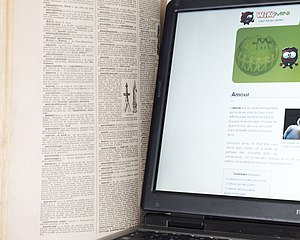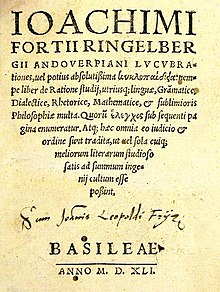
Back Ensiklopedie Afrikaans Enzyklopädie ALS መዝገበ ዕውቀት Amharic Enciclopedia AN Wīsdōmbōc ANG موسوعة Arabic موسوعة ARY موسوعه ARZ বিশ্বকোষ Assamese Enciclopedia AST


An encyclopedia (American English) or encyclopaedia/encyclopædia (British English)[1] (from Greek ἐγκύκλιος παιδεία meaning 'general education')[2] is a reference work or compendium providing summaries of knowledge, either general or special, in a particular field or discipline.[3][4] Encyclopedias are divided into articles or entries that are arranged alphabetically by article name[5] or by thematic categories, or else are hyperlinked and searchable.[6] Encyclopedia entries are longer and more detailed than those in most dictionaries.[5][7] Generally speaking, encyclopedia articles focus on factual information concerning the subject named in the article's title;[7] this is unlike dictionary entries, which focus on linguistic information about words, such as their etymology, meaning, pronunciation, use, and grammatical forms.[7][8][9][10][11]
Encyclopedias have existed for around 2,000 years and have evolved considerably during that time as regards language (written in a major international or a vernacular language), size (few or many volumes), intent (presentation of a global or a limited range of knowledge), cultural perspective (authoritative, ideological, didactic, utilitarian), authorship (qualifications, style), readership (education level, background, interests, capabilities), and the technologies available for their production and distribution (hand-written manuscripts, small or large print runs, Internet). As a valued source of reliable information compiled by experts, printed versions found a prominent place in libraries, schools and other educational institutions.
The appearance of digital and open-source versions in the 21st century, such as Wikipedia (combining with the wiki website format), has vastly expanded the accessibility, authorship, readership, and variety of encyclopedia entries.[12]
- ^ Stevenson, Angus; Lindberg, Christine A. (2015) [2010]. "encyclopedia". In Stevenson, Angus; Lindberg, Christine A. (eds.). New Oxford American Dictionary (3rd ed.). Oxford University Press. doi:10.1093/acref/9780195392883.001.0001. ISBN 9780195392883. Retrieved January 30, 2024 – via Oxford Reference.
- ^ "Encyclopedia | Definition, History, Examples, & Facts | Britannica". www.britannica.com. Retrieved October 13, 2024.
- ^ "Encyclopedia". Archived from the original on August 3, 2007. Glossary of Library Terms. Riverside City College, Digital Library/Learning Resource Center. Retrieved on: November 17, 2007.
- ^ "What are Reference Resources?". Eastern Illinois University. Archived from the original on November 22, 2022. Retrieved December 17, 2022.
- ^ a b Hartmann, R. R. K.; James, Gregory (1998). Dictionary of Lexicography. Routledge. p. 48. ISBN 978-0-415-14143-7. Archived from the original on January 14, 2021. Retrieved July 27, 2010.
- ^ "Encyclopedia". Merriam-Webster. Archived from the original on September 29, 2022. Retrieved December 17, 2022.
- ^ a b c Bocco, Diana (August 30, 2022). "What is an Encyclopedia?". Language Humanities. Archived from the original on September 27, 2022. Retrieved January 24, 2023.
- ^ Béjoint, Henri (2000). Modern Lexicography Archived December 30, 2016, at the Wayback Machine, pp. 30–31. Oxford University Press. ISBN 0-19-829951-6
- ^ "Encyclopaedia". Encyclopædia Britannica. Archived from the original on December 16, 2010. Retrieved July 27, 2010.
An English lexicographer, H.W. Fowler, wrote in the preface to the first edition (1911) of The Concise Oxford Dictionary of Current English language that a dictionary is concerned with the uses of words and phrases and with giving information about the things for which they stand only so far as current use of the words depends upon knowledge of those things. The emphasis in an encyclopedia is much more on the nature of the things for which the words and phrases stand.
- ^ Hartmann, R. R. K.; James, Gregory (1998). Dictionary of Lexicography. Routledge. p. 49. ISBN 978-0-415-14143-7. Archived from the original on January 14, 2021. Retrieved July 27, 2010.
In contrast with linguistic information, encyclopedia material is more concerned with the description of objective realities than the words or phrases that refer to them. In practice, however, there is no hard and fast boundary between factual and lexical knowledge.
- ^ Cowie, Anthony Paul (2009). The Oxford History of English Lexicography, Volume I. Oxford University Press. p. 22. ISBN 978-0-415-14143-7. Archived from the original on April 15, 2021. Retrieved August 17, 2010.
An 'encyclopedia' (encyclopaedia) usually gives more information than a dictionary; it explains not only the words but also the things and concepts referred to by the words.
- ^ Hunter, Dan; Lobato, Ramon; Richardson, Megan; Thomas, Julian (2013). Amateur Media: Social, Cultural and Legal Perspectives. Routledge. ISBN 978-0-415-78265-4.